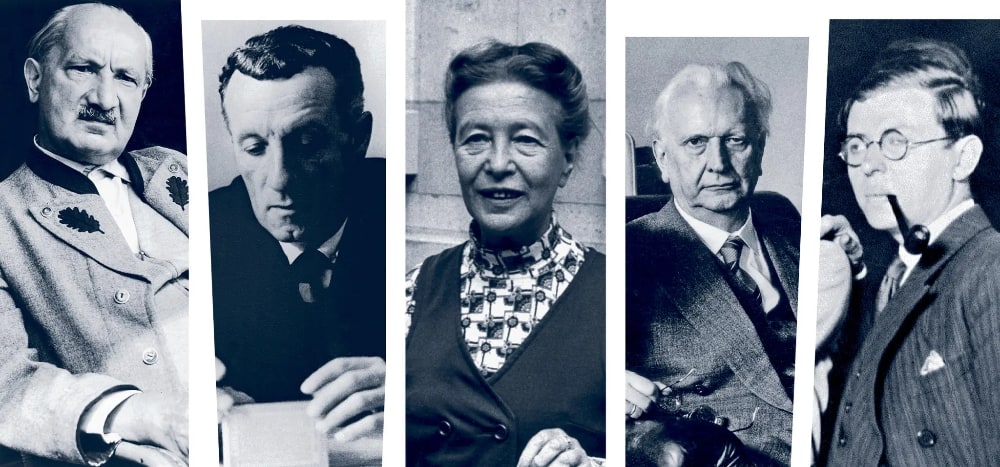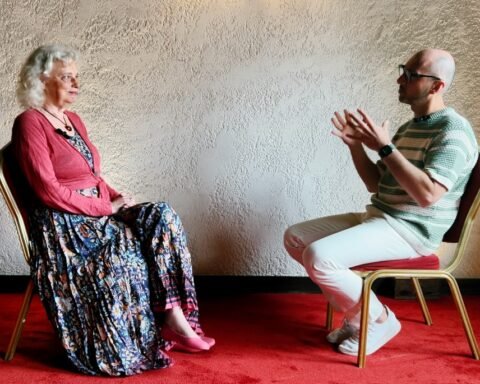Existential therapy is a philosophical approach to counselling or psychotherapy that emphasises the human experience of living and the inherent struggles and challenges that come with it. The idea that individuals are responsible for creating their own meaning and purpose in life is the basis of this approach. Existential psychotherapy is a diverse and evolving approach, with some practitioners seeing it as an attitude or orientation towards therapy in general, while others see it as a specific approach unto itself.
It primarily deals with individuals who are suffering and in crisis. It aims to soothe their distress and assist them in contending with life’s inevitable challenges in a more meaningful, fulfilling, authentic, and constructive mode. Some existential therapists take a symptom-centred or problem-oriented approach. In contrast, others engage in a wide-ranging inquiry of existence without exact therapeutic goals or effects.
The existential approach to therapy involves exploring fundamental questions about the nature of human existence. This approach places a responsibility on both the therapist and the client to actively engage with these ideas, understand our place in the world, and evaluate the consequences of our actions based on truth and reality. When we embrace this perspective wholeheartedly, it can become a fulfilling way of living life.
Existential therapy involves a supportive and collaborative examination of the patient’s or client’s life and experiences. It places a significant emphasis on the therapeutic relationship and reviewing the client’s relationships with their environment beyond the therapy session. It centres on the human condition and views all human experience as intrinsically connected to the fundamental nature of existence.
This method aims to understand how individuals make choices, develop their identities, and maintain their unique way of existing in the world. It values and recognises the constantly changing and contradictory aspects of human experience and encourages a deep curiosity about the essence of being human. Ultimately, it addresses fundamental questions about human existence, such as self-identity, purpose, free will, mortality, meaning, and how to live one’s life.
Exploring the Origins of the Term “Existential Therapy”
Since antiquity, for instance, in Greek philosophy, the study of human existence has been the most crucial focus. Greek mythology, like biblical narratives, contains stories offering instructions on how to approach and deal with these issues. Greek philosophy, also known as the love of wisdom, took a more systematic and practical approach to exploring these human problems. The main goal was to obtain wisdom and understanding of human existence that would surpass the explanations provided by mythology.
Existential therapy has its roots in philosophy from the 19th century, particularly in the work of philosophers who focused on human existence. Søren Kierkegaard and Friedrich Nietzsche are the two philosophers most closely associated with the origins of existential therapy. Despite their opposing views on many issues, both Kierkegaard and Nietzsche shared a commitment to exploring the nature of reality and how it is experienced.
Kierkegaard believed that internal wisdom was the key to overcoming human discontent, while Nietzsche introduced the idea of free will and personal responsibility. By the 20th century, philosophers such as Jean-Paul Sartre and Martin Heidegger had expanded on these ideas and began to explore the role that interpretation and investigation played in the healing process.
Heidegger and Sartre shared the belief that existence precedes essence. This implies that the simple fact of our existence is more fundamental than defining what we are. Our existence comes first, and our self-definitions evolve from it. As we exist and engage with the world around us, our essence takes shape gradually.
In the following decades, other contemporary thinkers like Martin Buber, Karl Jaspers, Simone de Beauvoir, Maurice Merleau-Ponty and others began to embrace the importance of the individual’s subjective experience in achieving psychological well-being.

Existential therapy has its roots in the early 20th century, founded by Karl Jaspers’ philosophy and Ludwig Binswanger, Medard Boss, and Viktor Frankl’s psychiatric practice. Frankl developed logotherapy after his experiences in suicide prevention and in concentration camps during World War II, where he observed that some people gave up. In contrast, others found a deeper meaning to getting through the horrors. Jaspers became a philosopher after leaving psychiatry training, while Boss and Binswanger sought new ways to tackle mental and emotional issues by taking their patients’ paradoxes and conflicts more directly.
In the 1960s and 1970s, RD Laing established therapeutic communities in the UK, providing alternative living spaces for individuals struggling with emotional survival. German existential theologist Paul Tillich, and psychologists Rollo May and Irvin Yalom later developed existential therapy as a mainstream therapeutic approach in the United States, with Yalom theorising that four primary issues – death, isolation, meaninglessness, and freedom – hinder individuals from achieving fulfilment.
As humans, we are in a constant state of transformation and evolution. The most crucial characteristic of a person is their dynamic, self-reflective, and ever-changing nature. Our existence and the ability to transform ourselves, be aware, and learn are paramount. Being alive is the foundation of our being and empowers us to adapt and grow.
Existential therapy is a type of counselling or psychotherapy that draws on ideas, values, and principles from phenomenological and existential philosophies. These philosophies centre around “core concerns” such as personal freedom, seeking meaning, and issues related to evil, isolation, suffering, guilt, anxiety, hopelessness, and death. In existential therapy, phenomenology is used to explore these ultimate concerns and understand an individual’s experience of existing in the world. The process starts by suspending one’s preconceptions to understand another person’s subjective reality fully.
Existential therapy is often sought by individuals going through an existential crisis, a specific circumstance in which one’s basic sense of survival, security, identity or significance is threatened. These existential threats can be physical, social, emotional or spiritual. They can be directed towards oneself, others, the world in general or the ideas and perceptions we live by. They force us to question and doubt our most deeply held beliefs or values. Because human existence is continually changing, we are naturally prone to experiencing such existential challenges or crises across our lifespan. In existential therapy, these disorienting and anxiety-provoking periods of crisis are perceived as both a dangerous passage and an opportunity for transformation and growth.
Existential psychotherapy does not seek to cure or explain, it merely seeks to explore, describe and clarify in order to try to understand the human predicament (van Deurzen, 2010).
What is the process of existential therapy?
In existential therapy, the therapist and client engage in a collaborative and exploratory dialogue, with the therapist providing professional assistance to the client seeking help. A vital aspect of the therapy is developing a caring, honest, supportive, and empathetic yet challenging relationship between therapist and client, as this relationship plays a crucial role in the therapeutic process.
Existential therapy delves into how a person’s feelings in the current moment, thoughts, and interactions can shed light on their past experiences, everyday reality, and future aspirations. This approach, which combines a respectful, compassionate, and realistic approach with a focus on phenomenological observation, allows therapists to understand and effectively address a person’s way of existing in the world.
Instead of trying to avoid or minimise our difficulties, we learn to appreciate them as opportunities to gain new insights. Our human problems are like puzzles that help us understand the bigger picture of life. By approaching these issues with curiosity and openness, we can deepen our understanding of ourselves and our place in the world.
Existential therapists strive to avoid imposing their own beliefs and values on clients. Instead, they may bring attention to inconsistencies, contradictions, or paradoxes in a person’s actions. When needed, they may constructively confront self-defeating or harmful behaviours to help clients address them.

While some therapists may choose to confront harmful behaviours, others may avoid categorizing experiences or expressions as positive or negative. The ultimate objective of existential therapy is to help clients understand their problems in a broader context and empower them to recognize, accept, and exercise their freedom and responsibility to change or accept their current circumstances. This can include the ability to tolerate, affirm, and embrace their chosen way of being in the world.
Existential therapy aims to empower clients by helping them understand their inner experience, subjectivity, and being in the present moment. This includes the temporal, ever-changing flow of thoughts, sensations, and feelings. The therapy also acknowledges the impact of the past and future on the present. It encourages clients to explore and address it. To facilitate the therapeutic process, it focuses on increasing clients’ awareness of their inner experience and how it relates to the past, present, and future.
How does existential therapy differ from other forms of therapy?
Existential therapy is a unique approach to therapy that focuses on the therapeutic relationship, actual experience, and the philosophical and phenomenological aspects of human existence. It is less concerned with diagnosing and providing rapid symptom relief than other forms of therapy. Instead, it recognises symptoms such as anxiety, depression, or rage as meaningful reactions to current circumstances and personal history. Existential therapy aims to explore these symptoms in depth rather than trying to suppress or eliminate them. It is more exploratory than goal-oriented and aims to clarify, understand, and describe suffering rather than analysing, explaining, treating or curing it.
What are the techniques and methods used in existential therapy?
Existential therapy relies on something other than prearranged techniques, and some practitioners may avoid them entirely to maintain the integrity and honesty of the therapeutic relationship. However, the phenomenological method is commonly used in which the therapist strives to be fully present and engage with the client without prejudices. Additionally, some existential therapists use basic skills such as empathic reflection, Socratic questioning, and active listening and may also draw on techniques from other therapies, such as psychodynamics, cognitive-behavioural therapy, person-centred, somatic, and gestalt therapy, to tailor the approach to the individual client’s needs. The ultimate goal is to help the client understand and accept their current experience in the context of their life.
What are the objectives of existential therapy?
The main objective of existential therapy is to assist clients in exploring their lived experiences honestly, openly, and comprehensively. Through this collaborative process of discovery, clients can gain a clearer understanding of their experiences and the meanings they hold. This self-exploration allows individuals to confront and grapple with profound philosophical, spiritual, and existential questions and the practical challenges of daily living. By fully participating in this supportive, exploratory, and challenging process, clients can gain insight into their existence and take responsibility for how they have chosen to live. This can lead to greater fulfilment, meaning, and authenticity in their lives.
Who can benefit from an existential approach to therapy?
Existential therapy is beneficial for a wide range of individuals. This can be used to address various problems, symptoms, or challenges. It can be used with clients, such as children, senior citizens, couples, families, and groups, and in various settings like clinics, hospitals, private practices, workplaces, organisations, and the wider community. The approach acknowledges that people exist in an interrelated context with the world, making it particularly useful for working with clients from diverse backgrounds.
While it is particularly suitable for people looking to explore their philosophical stance towards life, it may not be the best choice for patients needing quick relief from severe psychiatric symptoms. However, it can still be a practical approach in addressing severe reactions to psychological, spiritual or existential disruptions or upheavals in their lives, whether used in combination with psychiatric medication or on its own.
What is the scientific evidence for the effectiveness of existential therapy?
Research has shown that certain forms of existential therapy can increase well-being and sense of meaning for specific client groups (1). The evidence is growing, with new studies suggesting that existential therapy can produce results similar to other therapeutic approaches (2). This is consistent with decades of research which suggest that all forms of psychotherapy are effective and that most therapies are more or less equally helpful (3), with specific client characteristics and preferences determining the best approach for an individual. Additionally, research suggests that the warm, valuing, and empathic relationship between the therapist and client is a crucial factor in positive therapeutic outcomes (5) and that existential therapy’s emphasis on finding or making meaning is a significant factor in effective treatment (4).
References:
- Vos, J., Craig, M., & Cooper, M. (2014). Existential therapies: A meta-analysis of their effects on psychological outcomes. Journal of Consulting and Clinical Psychology, 83(1), 115-128. doi: 10.1037/a0037167
- Rayner, M., & Vitali, D. (in press). Short-term existential psychotherapy in primary care: A quantitative report. Journal of Humanistic Psychology. [Spanish translation published as Rayner, M. y Vitali, D. (2015). Psicoterapia existencial de corto plazo en atención primaria: Un reporte cuantitativo. Revista electrónica Latinoamericana de Psicologia Existencial “Un enfoque comprensivo del ser”. N° 11. Octubre.]
- Seligman, M. E. P. (1995). The effectiveness of psychotherapy: The Consumer Reports study. American Psychologist, 50(12), 965–974.
- Wampold, B. E., & Imel, Z. E. (2015). The Great Psychotherapy Debate: The Evidence for What Makes Psychotherapy Work (2nd ed.). New York: Routledge.
- Norcross, J. C., & Lambert, M. J. (2011). Evidence-based therapy relationships. In J. C. Norcross (Ed.), Psychotherapy relationships that work: Evidence-based responsiveness (2nd ed., pp. 3-21). New York: Oxford University.
- Deurzen, E. V. (2009). Everyday mysteries: A handbook of existential psychotherapy. Routledge.










I’m definitely going to share this with my friends. Your writing style makes this topic very engaging. Such a helpful article, thanks for posting! Thank you for breaking down complex concepts so clearly. The content in this blog is truly eye-opening.